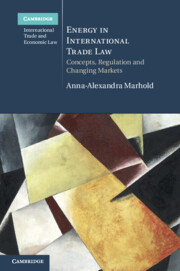Book contents
- Energy in International Trade Law
- Cambridge International Trade and Economic Law
- Energy in International Trade Law
- Copyright page
- Dedication
- Contents
- Tables
- Foreword
- Acknowledgements
- Tables of Cases
- Acronyms and Abbreviations
- Introduction and Objectives
- Part I Energy in International Trade Law: Concepts, History and Legal Framework
- Part II International Trade Law and Changing Energy Markets: Decentralization, Decarbonization and Energy Security
- 5 Decentralizing Energy Markets in the Light of International Trade Law: OPEC and the EU Internal Energy Market
- 6 Decarbonizing Energy Markets: Constraining Dual Pricing and Options for Fossil Fuel Subsidy Reform in the WTO
- 7 The Emerging Concept of Energy Security in International Trade Law
- 8 General Conclusion and Recommendations
- Bibliography
- Index
5 - Decentralizing Energy Markets in the Light of International Trade Law: OPEC and the EU Internal Energy Market
from Part II - International Trade Law and Changing Energy Markets: Decentralization, Decarbonization and Energy Security
Published online by Cambridge University Press: 24 June 2021
- Energy in International Trade Law
- Cambridge International Trade and Economic Law
- Energy in International Trade Law
- Copyright page
- Dedication
- Contents
- Tables
- Foreword
- Acknowledgements
- Tables of Cases
- Acronyms and Abbreviations
- Introduction and Objectives
- Part I Energy in International Trade Law: Concepts, History and Legal Framework
- Part II International Trade Law and Changing Energy Markets: Decentralization, Decarbonization and Energy Security
- 5 Decentralizing Energy Markets in the Light of International Trade Law: OPEC and the EU Internal Energy Market
- 6 Decarbonizing Energy Markets: Constraining Dual Pricing and Options for Fossil Fuel Subsidy Reform in the WTO
- 7 The Emerging Concept of Energy Security in International Trade Law
- 8 General Conclusion and Recommendations
- Bibliography
- Index
Summary
Decentralization of the energy sector means the breaking-up of the sector and its vertically integrated enterprises and/or global cartels by separating its distinct functions (extraction, transmission and sale), thereby allowing for increased competition in the market. This chapter uses two case studies to illustrate the challenges the decentralization of largely vertically integrated energy markets poses for international trade law, including international trade law’s inability to deal comprehensively with the production quota practices of global energy cartels such as the Organization of Petroleum Exporting Countries (OPEC). The chapter then studies regional energy market decentralization policies (in this case the European internal market), focusing on the panel report in EU – Energy Package, and considers which WTO rules facilitate such policies and which constrain them.
Keywords
- Type
- Chapter
- Information
- Energy in International Trade LawConcepts, Regulation and Changing Markets, pp. 159 - 210Publisher: Cambridge University PressPrint publication year: 2021



